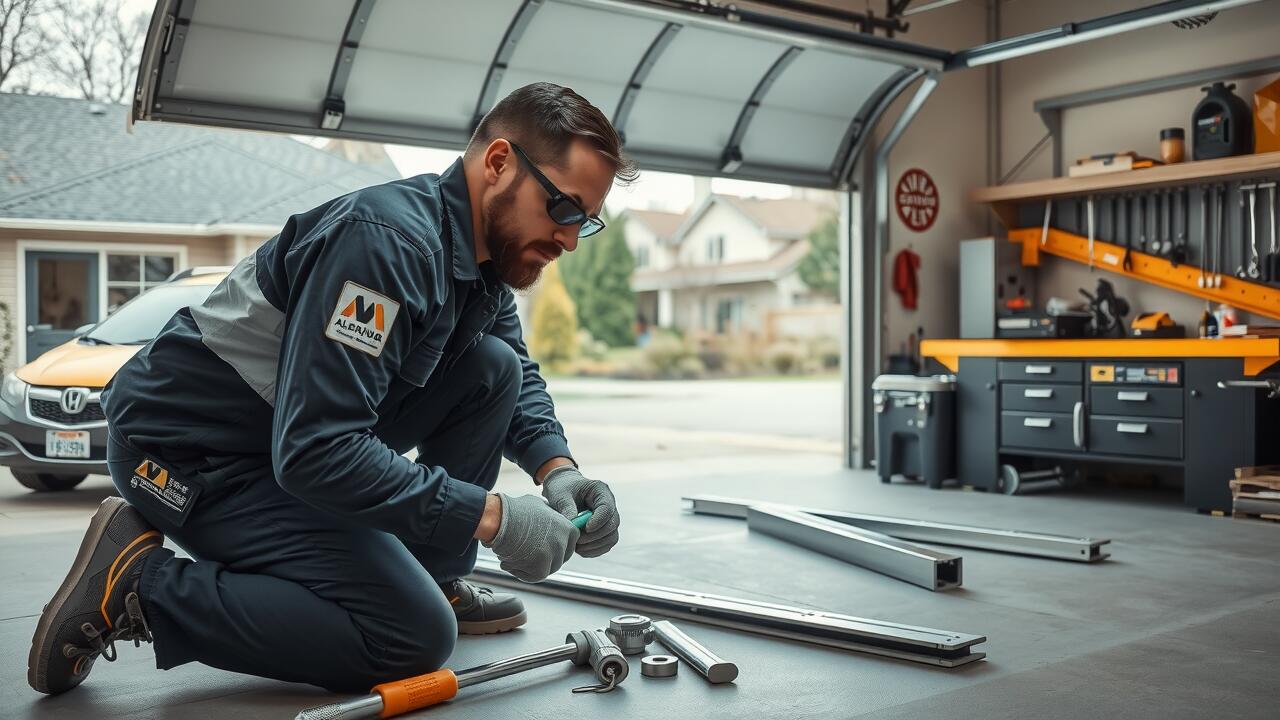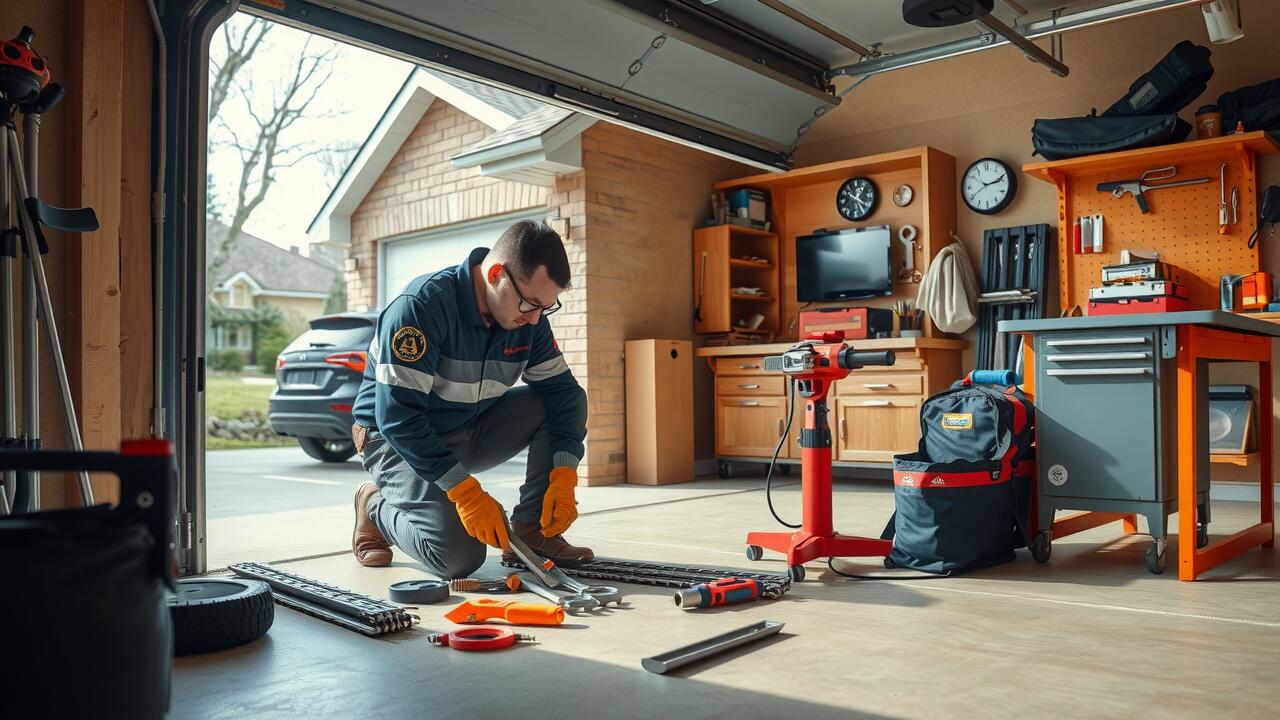
Table Of Contents
Choosing the Right Replacement Track
When considering a garage door track replacement in your home, it’s essential to assess the specific requirements of your garage door type and size. Various tracks are available, each designed to support different door weights and operation styles. Factors such as the door’s material and how frequently it is used can influence the choice of track, so selecting an appropriate one ensures a seamless function.
Additionally, taking the time to evaluate the installation process can help determine whether a DIY approach is feasible or if professional assistance is necessary. Understanding the features of the replacement track, such as durability and compatibility with existing door systems, will lead to a more informed decision. Prioritizing these aspects can enhance the effectiveness of the new track and prevent future issues.
Material Options and Their Pricing
When considering garage door track replacement, the choice of material significantly influences both durability and cost. Steel tracks are among the most popular options due to their strength and resistance to bending or warping. They typically range from $50 to $150 depending on gauge and thickness. Aluminum tracks offer a lighter alternative and are priced lower, usually between $30 and $100. However, they may not withstand heavy usage as effectively as steel.
Wood tracks, although less common today, present a classic aesthetic but come with a higher price tag and require regular maintenance. Expect to pay between $100 and $200 for these, depending on craftsmanship and wood type. Vinyl tracks provide a corrosion-resistant solution with prices ranging from $40 to $120. When planning for garage door track replacement in your home, understanding these material options and their respective costs will help in making an informed decision.
Signs Your Garage Track Needs Replacement
Identifying the need for a garage track replacement comes from observing various signs of wear and damage. If you notice that your garage door is struggling to open or close smoothly, this could indicate that the track is bent, misaligned, or worn out. Additionally, any significant noise during operation, such as grinding or scraping sounds, often points to underlying issues with the track. These symptoms not only affect convenience but can also compromise the safety of the garage door system.
Another crucial sign that warrants a garage door track replacement is visible physical damage. Cracks, rust, or deformation of the tracks can lead to more severe problems if not addressed promptly. In such cases, the door may become unstable or even fall off the track. Regular inspections can help catch these issues before they escalate. For many homeowners, recognizing these signs early contributes to avoiding costly repairs and ensures the garage door operates efficiently for years to come.
Common Issues to Look For
When assessing the condition of your garage door tracks, it’s essential to look for visible signs of wear and damage. Misalignment can easily cause doors to stick or jam. Inspect the tracks for dents, rust, or excessive dirt buildup. These issues can lead to more serious problems if not addressed, ultimately requiring Garage Door Track Replacement in the future.
Another common issue is the presence of gaps between the rollers and the track itself. This can indicate that the tracks have been bent or damaged over time. Listen for unusual noises while operating the garage door; grinding or scraping sounds often signal that the tracks may be compromised. Regular monitoring can help prevent the need for immediate Garage Door Track Replacement in your home.
Benefits of Replacing Garage Tracks
Replacing garage tracks offers several advantages, particularly in enhancing the functionality of your garage door system. When tracks become damaged or outdated, they can cause operational issues such as jerky movement or difficulty in opening and closing the door. By opting for garage door track replacement in a timely manner, you can restore smooth, effortless operation, ensuring that your garage door operates as it should.
Safety is another critical benefit associated with replacing garage tracks. Damaged tracks can lead to misalignment, increasing the risk of the door falling unexpectedly. This can pose a significant hazard to both vehicles and individuals in the vicinity. Choosing garage door track replacement in your home not only boosts the performance of the door but also drastically improves safety for you and your loved ones.
Improved Functionality and Safety
Replacing garage tracks can significantly enhance the overall functionality of your garage door system. When tracks are worn, misaligned, or compromised, the door’s movement becomes erratic. A smooth and properly aligned track ensures that the door opens and closes effortlessly, which can help extend the lifespan of the door and its components. Garage Door Track Replacement in a timely manner can prevent costly repairs down the line associated with more extensive damage caused by faulty tracks.
Safety is another critical factor to consider when addressing garage track issues. A malfunctioning track can lead to accidents, such as the door unexpectedly falling or failing to close securely. This poses risks not only to personal safety but also to property security. Ensuring proper upkeep through Garage Door Track Replacement provides peace of mind. A well-maintained system minimizes hazards and protects both your family and valuables.
FAQS
How much does it typically cost to replace a garage door track?
The cost to replace a garage door track can range from $100 to $300, depending on the material, labor costs, and whether you are replacing one or both tracks.
What factors influence the cost of garage track replacement?
Factors that can influence the cost include the type of material used for the tracks, labor rates in your area, the complexity of the installation, and any additional repairs needed.
Can I replace the garage track myself to save money?
While it is possible to replace the garage track yourself, it requires specific tools and knowledge. If you’re not experienced with garage door repairs, it’s advisable to hire a professional to ensure safety and proper installation.
Are there different types of garage track materials, and do they affect the price?
Yes, garage tracks come in various materials such as steel, aluminum, and plastic. Steel tracks are generally more durable but may be more expensive, while aluminum and plastic options can be more affordable but might not last as long.
How do I know if my garage track needs to be replaced?
Signs that your garage track needs replacement include visible rust or damage, the door not moving smoothly, unusual noises during operation, or if the door is misaligned. If you notice any of these issues, it’s best to consult a professional.
